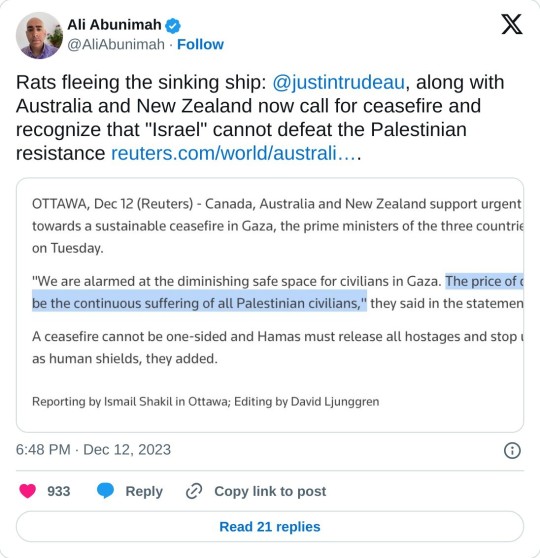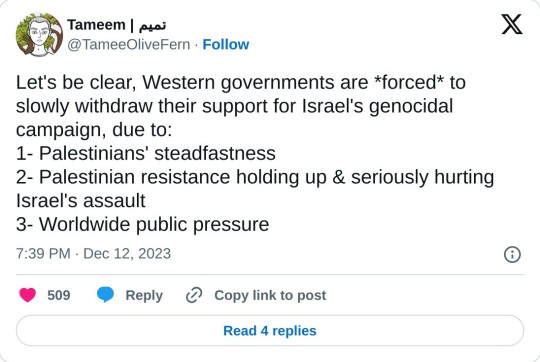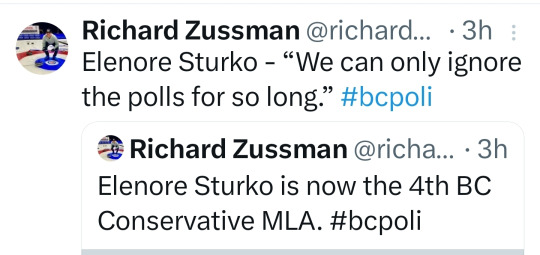#undrip
Explore tagged Tumblr posts
Text
We need to talk about US Indian boarding schools
We need to come together and acknowledge what was done to Native Americans in the name of "civilization."
Mass graves have been found in Canada, with surely others still to be found, and nearly all in the US remain to be located, but they are surely somewhere. What was done to these human beings in the name of ‘civilization’ is shocking. Be prepared: this involves the worst potential of our species. If you experienced childhood abuse of any kind, please take care. [click through for the rest]

View On WordPress
6 notes
·
View notes
Text
What's interesting here is that these 3 countries, along with the US, were the only ones who originally voted against the United Nations Declaration on the Rights of Indigenous Peoples, as they are the wealthiest colonized nations who only have wealth and power due to the theft of Indigenous land and the genocide of Indigenous peoples. They cannot automatically support something pro-Indigenous without having the light cast back on them as hypocrites. This response, while not what the countries originally wanted, has been calculated to try to keep it quiet.

Article

#Indigenous#canada#australia#aotearoa#aotearoa new zealand#new zealand#turtle island#palestine#ceasefire#ceasefire now#undrip#united nations declaration on the rights of Indigenous Peoples
15K notes
·
View notes
Text
Il Canada provò – e ancora insiste – a cancellare i diritti dei Nativi
di Raffaella Milandri© La questione del colonialismo e dei diritti dei Popoli Indigeni è antica come e più di Cristoforo Colombo, e mette sui due piatti della bilancia, come in molte questioni di attualità in altre parti del nostro Pianeta, i vecchi poteri occidentali e il resto del mondo. I Nativi del Nord America sono tra i popoli più in vista in queste contrapposizioni e lotte che vanno…
#canada#Dichiarazione delle Nazioni Unite sui diritti dei Popoli Indigeni#first nations#indiani d&039;america#nativi americani#raffaella milandri#undrip#white paper
0 notes
Text
BC party power play is a foolish game
Welcome to BC Politics, unfolding drama # 123243 This time it’s the seeming crash of the BC United Party as several of its candidates and MLA’s cross the floor to the upstart BC Conservative Party. Ordinarily I wouldn’t care as I support neither of these two parties, but I see a trend that should be talked about and called out. Crossing the floor happens in politics from time to time, yes..but…

View On WordPress
0 notes
Text
https://lnkd.in/e_MjMy_5https://lnkd.in/ehxfEd4Khttps://lnkd.in/eys_2Q8r SOVEREIGNTY, SELF-DETERMINATION & LAND BACK: A PATH FORWARD FOR OUR TREATY & INHERENT RIGHTS. A Discussion Paper Prepared for the Office of the National Chief March 2023 by Russ Diabo, Special Advisor to the National Chief FOR DISCUSSION
Links
1. https://lnkd.in/ememKHbC https://lnkd.in/ekBVQPeH XR HUMANITY’S EMERGENCY SERVICES SOCIAL, CLIMATE JUSTICE LOCAL, STOP THE ROT - FREE RESOURCES UPDATED 2 July 2023
2. https://lnkd.in/e_MjMy_5 https://lnkd.in/ehxfEd4K https://lnkd.in/eys_2Q8r Show this thread SOVEREIGNTY, SELF-DETERMINATION & LAND BACK: A PATH FORWARD FOR OUR TREATY & INHERENT RIGHTS. A Discussion Paper Prepared for the Office of the National Chief March 2023 by Russ Diabo, Special Advisor to the National Chief FOR DISCUSSION #Ethics #Morality #Law #HumanRights #RightsOfMotherEarth #IndigenousPeoples #Canada #UNDRIP not #CANDRIP #KillBillC15 #ImmoralLeadership #FailedLeadership #CorruptColonialCrownCorporations #StopEcocide @EcocideLaw #InternationalHumanRightsLawAndStandards 1 July 2023
3. https://lnkd.in/eKDneFBN https://lnkd.in/eTKsnhzP Corrupt colonial Crown capitalism UK CA contains the seeds of its own destruction. A human-centric, holistic, rights-based, advocating regenerative culture educational framework for justice, about the root causes of our cost-of-living-climate-crisis on planet earth. #AI #OpenSource GPT Chat Llewelyn Pritchard MA 28 June 2023 #Education #Values #SelectionOfValues #Culture #CulturalValues #Beliefs #UK #CA
4. https://lnkd.in/eDhWgGaV https://lnkd.in/e__nvHgD
LIST OF PAGES XR HUMANITY’S EMERGENCY SERVICES SOCIAL, CLIMATE JUSTICE LOCAL, STOP THE ROT - FREE RESOURCES
#Ethics#Morality#Law#HumanRights#RightsOfMotherEarth#IndigenousPeoples#Canada#UNDRIP not#CANDRIP#KillBillC15#ImmoralLeadership#FailedLeadership#CorruptColonialCrownCorporations#StopEcocide#InternationalHumanRightsLawAndStandards#climatejustice#uk#corruption#rightsofnature#civilresistance#costoflivingclimatejustice#turnbacktheclock#Education#Values#SelectionOfValues#Culture#CulturalValues#Beliefs#UK#CA
8 notes
·
View notes
Text
So essentially the BC conservatives want to get rid of the law that provides the most protection and autonomy for Indigenous people in that province.
UNDRIP was incorporated into provincial law in british colombia by the Declaration on the Rights of Indigenous Peoples Act, which is what conservatives want to get rid of.
The Declaration Act aims to create a path forward that respects the human rights of Indigenous Peoples while introducing better transparency and predictability in the work we do together.
There are four key areas of the legislation:
Section 3 mandates the government to bring provincial laws into alignment with the UN Declaration.
Section 4 requires the Province to develop and implement an action plan, in consultation and co-operation with Indigenous Peoples, to meet the objectives of the UN Declaration.
Section 5 requires regular reporting to the legislature to monitor progress on the alignment of laws and implementation of the action plan, including tabling annual reports by June 30 of each year.
Sections 6 and 7 allow for flexibility for the Province to enter into agreements with a broader range of Indigenous governments and to exercise statutory decision-making authority together.
(emphasis mine)
And those are just some of the things that the Declaration Act formalizes to support Indigenous communities. Repealing it would have a drastic impact on Indigenous people in BC
source
British Columbia saw a rare unanimous vote in its legislature in October 2019, when members passed a law adopting the United Nations Declarations on the Rights of Indigenous Peoples, setting out standards including free, prior and informed consent for actions affecting them. The law “fundamentally changed the relationship” between First Nations and the province, said Terry Teegee, regional chief of the B.C. Assembly of First Nations. [...] John Rustad threw his support behind the legislation as a member of the Official Opposition B.C. Liberal Party, but as the B.C. Conservative leader he has since signalled his intention to “repeal” the law if his party wins the Oct. 19 provincial election.
Continue Reading
Tagging: @newsfromstolenland
#Indigenous#First Nations#BC#british columbia#UNDRIP#Declaration on the Rights of Indigenous Peoples Act#mine#tagged as mine for the addition
229 notes
·
View notes
Text
so the eu elections resulted in a massive shift towards the right / towards nationalism and the BC conservatives over in canada are saying we need to repeal our commitment to UNDRIP . totally normal not scary at all
#whats happening!!!!#not that the NDPs commitment to undrip has done fuckall#they just violate it#but we do not need to repeal it oh my god
0 notes
Text
Canada and Australia crafted government-friendly UNDRIP substitute in 2002-03, documents show
20 notes
·
View notes
Note
I have a crush on eleven rivers
is it his flat ass or his shitpiss attitude or his rizzless undrip or his murderous tendencies or his severe pessimism or his cowardy demeanor or is it because hes blue
15 notes
·
View notes
Text
I am not a sweary person, as you know but:
SERIOUSLY WHAT THE FUCK.
Provincial Conservatives on opposite sides of the country making jaw-dropping headlines during National Truth & Reconciliation Day.
"Sherry Wilson said the federal system of forcing tens of thousands of First Nations, Inuit and Métis children into the schools was "only allowed to happen because children enrolled in school were isolated from their parents' oversight, input and influence."
She implied there was a parallel between that and the province's original Policy 713 — which allowed 2SLGBTQ+ students to adopt names and pronouns at school without their parents knowing."
And this:
"[Conservative candidate] Rustad said if his party wins the Oct. 19 provincial election, B.C. would partner with First Nations and "unleash the potential" for prosperity through mining, forestry and other resource projects.
He has previously pledged to repeal B.C. legislation adopting the United Nations Declaration on the Rights of Indigenous Peoples (UNDRIP). Instead, his party said in a release, it would honour the declaration "as it was intended," with laws advancing economic reconciliation and Indigenous autonomy."
#Vote them out#vote#canpoli#bcpoli#british columbia#new brunswick#election 2024#bc election#canadian politics#indigenous rights#indigenous canadians
5 notes
·
View notes
Text
The City of Vancouver and three First Nations have launched an action plan that aims to right historical wrongs and recognize the rights and titles of Indigenous people.
The plan, announced Monday, aims to implement the United Nations Declaration on the Rights of Indigenous People (UNDRIP) strategy. It includes a total of 18 action groups to be implemented between 2024 to 2028.
Some of its goals include addressing environmental racism, acknowledging Indigenous peoples’ cultural presence and identifying more economic partnership opportunities.
“By upholding and honouring Indigenous cultures, ways of life, and ancestral connections to the land and waters, Vancouver is set to become a city where the rights of all people are truly recognized and respected.” Khelsilem, Squamish Nation chairperson and task force co-chair said in a statement. [...]
Continue Reading.
Tagging: @newsfromstolenland, @vague-humanoid, @palipunk
#cdnpoli#Vancouver#British Columbia#Indigenous politics#First Nations#Squamish#Tsleil-Waututh#Musqueam#Truth and Reconciliation
35 notes
·
View notes
Text
https://muskratfallscivilrightsmovement.blogspot.com/ Muskrat Falls Civil Rights Movement https://lnkd.in/e_MjMy_5 https://lnkd.in/ehxfEd4K https://lnkd.in/eys_2Q8r Show this thread SOVEREIGNTY, SELF-DETERMINATION & LAND BACK: A PATH FORWARD FOR OUR TREATY & INHERENT RIGHTS. A Discussion Paper Prepared for the Office of the National Chief March 2023 by Russ Diabo, Special Advisor to the National Chief FOR DISCUSSION
#Ethics#Morality#Law#HumanRights#RightsOfMotherEarth#IndigenousPeoples#TurtleIsland#Canada#UNDRIP not#CANDRIP#KillBillC15#ImmoralLeadership#FailedLeadership#CorruptColonialCrownCorporations#StopEcocide @EcocideLaw#InternationalHumanRightsLawAndStandards
2 notes
·
View notes
Text
First Nations are negotiating with government on sharing crucial decisions over forestry, mining and construction
A wild experiment is under way in British Columbia, Canada’s westernmost province: the government is rewriting its laws to share power with Indigenous nations over a land base bigger than France and Germany combined.
Decades in the making, this transition entered history in 2019, when BC became the first jurisdiction on Earth to sign the Declaration on the Rights of Indigenous Peoples (UNDRIP) into law. This means the regional government would share decision-making power over land management matters with First Nations, potentially affecting leasing and licences for forestry, mining and construction.
Continue reading...
3 notes
·
View notes
Text
Meaningful Engagement with First Nations Tourism (Please Mark)
Australia’s First Nations peoples are part of the oldest continuous living cultures, deeply embedded in Queensland’s landscape. With over 221,000 Indigenous residents, Queensland’s First Nations tourism offers a unique opportunity for meaningful international engagement (Queensland Government, 2016).
Supporting First Nations tourism isn’t just about visiting sites; rather, it’s about actively participating in a process of mutual respect and understanding. This includes engaging with Indigenous-owned businesses, community-run tourism operations, and national parks managed by First Nations people (QTIC, 2023). These ventures align with the Queensland Government’s initiative, Towards 2032, which integrates Indigenous perspectives into the state’s tourism future (DTIS, 2023).
Furthermore, this engagement goes beyond a one-time interaction and focuses on building relationships based on trust, respect, and shared goals. The United Nations Declaration on the Rights of Indigenous Peoples emphasizes obtaining free, prior, and informed consent from Indigenous communities, a principle that should guide our approach as tourists (UNDRIP, 2007).
The most impactful experiences often come from listening to the stories shared by Indigenous guides and Elders. These are opportunities for truth-telling and reconciliation, not just tourism. By respecting Indigenous protocols and supporting their efforts to transform tourism into a tool for cultural preservation, we contribute to their empowerment (QTIC, 2023).
Ultimately, meaningful engagement is about recognizing that we are visitors on lands cared for by Indigenous peoples for millennia. It’s our responsibility to listen, learn, and support their ongoing journey, fostering a deeper connection and understanding that benefits both visitors and the communities we engage with.

2 notes
·
View notes
Text
AUSTRALIA POLITICS: "UNDRIP." 22/10/23. (1AM.)
------------------------------------------------------------------------- Undoubtedly, the treaty was at the center of The Voice. Without equivocation, the referendum was defeated, and the changes they sought will be a continuing battle. -------------------------------------------------------------------------

------------------------------------------------------------------------- What is the counterargument from the opposition? Why not conveniently classify anyone who disagrees with it as a conspiracy theorist? And what exactly is this "jurisdiction" that they keep mentioning? No such phrase appears in our country's constitution. WE THE PEOPLE, as a constitutional monarchy, are the legitimate authority. ------------------------------------------------------------------------- As Australians, we must all get aware with the UNDRIP and constantly oppose it in its entirety. It is like not many discuss UNDRIP and what this is really about.
------------------------------------------------------------------------- Do you know what 'UNDRIP' is? Australia has signed up to it. "Since adoption of the Declaration, Australia, New Zealand, United States and Canada have all reversed their positions and expressed support for the Declaration. Colombia and Samoa have also endorsed the Declaration." Although the government may have approved it, the Australian people did not; neither have they ever allowed a vote on this or immigration-related issues.
Every Australian should be greatly concerned by two articles of the Declaration, and if their elected representatives continue to support them, they should be made aware that they will not be re-elected. -> Article 26:
Indigenous peoples have the right to the lands, territories and resources which they have traditionally owned, occupied or otherwise used or acquired.
Indigenous peoples have the right to own, use, develop and control the lands, territories and resources that they possess by reason of traditional ownership or other traditional occupation or use, as well as those which they have otherwise acquired.
States shall give legal recognition and protection to these lands, territories and resources. Such recognition shall be conducted with due respect to the customs, traditions and land tenure systems of the indigenous peoples concerned.
-> Article 28:
Indigenous peoples have the right to redress, by means that can include restitution or, when this is not possible, of a just, fair and equitable compensation, for the lands, territories and resources which they have traditionally owned or otherwise occupied or used, and which have been confiscated, taken, occupied, used or damaged without their free, prior and informed consent.
Unless otherwise freely agreed upon by the peoples concerned, compensation shall take the form of lands, territories and resources equal in quality, size and legal status or of monetary compensation or other appropriate redress. ----------------------------------------------------------------------
5 notes
·
View notes
Text
Something that's insane to me is how there are basically two answers people give to the question of whether Jewish people are indigenous to the Levant: It's either "Of course they are, and any claim to the contrary is wildly antiemitic" or "Of course they aren't, and even asking this question betrays a fundamental misunderstanding of indigenous rights movements." When really, as far as I can tell, the only honest answer would be: "That depends entirely on your conception of indigeneity, there is no universally agreed upon definition."
Seriously, there is a whole-ass UN Declaration on the Rights of Indigenous Peoples (the acronym UNDRIP has retroactively been granted a certain hilarity thanks to recent developments of English vernacular), and the entire text does not mention any criteria clarifying to whom these rights should and shouldn't apply. It doesn't make a lot of a difference, not many states have ratified the declaration, the US of course haven't, but, like, still.
I shouldn't be surprised, this is just how most political and social categories work, but I don't think I will ever stop finding this kind of situation frustrating. "Group X is indigenous" really just means "I think we should treat group X a certain way." Like, the only difference between these two statements is that the shorter one is less honest about the intentions behind it. And I hate it with a passion. Instinctively I want to say, people who don't keep their Is- and their Ought-statements properly separate are inherently untrustworthy. But everyone is doing it! I'm probably doing it too. I try make a bit of an effort not to, but I'm not nearly neurotic enough, that's what editors are for.
6 notes
·
View notes